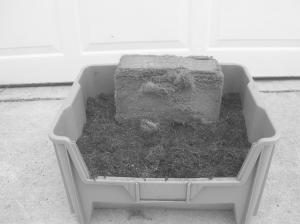2006 - Volume #30, Issue #6, Page #13
[ Sample Stories From This Issue | List of All Stories In This Issue | Print this story
| Read this issue]
Coconut Fiber Works Better Than Peat Moss
 |
This summer I got the chance to try some coir, and it was amazing. You can watch it expand as it sucks up available water and holds it. By comparison, you can pour water on peat moss all day and all it will do is float away. Compacted blocks of coir practically exploded into piles of organic material, ready to be mixed with soil for pots or used by itself in hydroponic production.
"Coir fibers hold water on the inside, slowly letting it go as the plant needs it," explains Mark Wittman, horticulturist, Casetech Australia. "Our hanging plants can go two or three days without watering in hot weather, where pots without coir have a hard time lasting a single day."
I used my coir, both as added organic matter in holes dug for shrubs and as a starting material for red twig dogwood stems that I wished to sprout. As a part-time gardener, I tend to select for plants based on their "negligence tolerance". While stems started in a mix of soil and peat moss died from infrequent watering, the coir-started stems survived and thrived.
Unlike peat moss, which is mined, coir is a byproduct of the coconut industry. Often simply left to break down, it is a major pollution problem in some coconut producing countries. Casetech obtains its organic coconut fiber from Sri Lanka and markets it for home and commercial uses. The company uses only fresh coconut fiber, processing it indoors to maintain quality and to prevent composting.
"Some companies market coir that has been stored outside and has begun composting," says Wittman. "It will not last as long or provide as healthy a growing medium for plants."
Casetech markets coir in lightweight potting mixes, as garden mulch, and as an organic growing media. Products for greenhouse and other commercial operations include slabs, grow pots, mixes, blocks and rehydrated bulk.
Casetech prides itself on the convenient nature of its products. For example, grow pots are plastic bags with blocks of dried compressed coir. They're easy to transport and store. To prepare for plants, the operator unfolds the oversize plastic flaps, adds water and in a few minutes, sets plants. Later the entire bag can be set in a pot or holder.
"We will be introducing many of these same products to the North American market," says Wittman, an American who formerly headed a large greenhouse operation in Minnesota.
Casetech is currently exploring distributorships and marketing arrangements in the U.S. and Canada.
Contact: FARM SHOW Followup, Casetech Australia Pty Ltd., 16 Williams Rd, Dandenong, Victoria 3175 Australia; (ph 011 61 3 9791 2060; fax 011 61 3 9791 3080; casetech@casetech.com.au; www.case tech.com.au).

Click here to download page story appeared in.

Click here to read entire issue
To read the rest of this story, download this issue below or click here to register with your account number.




